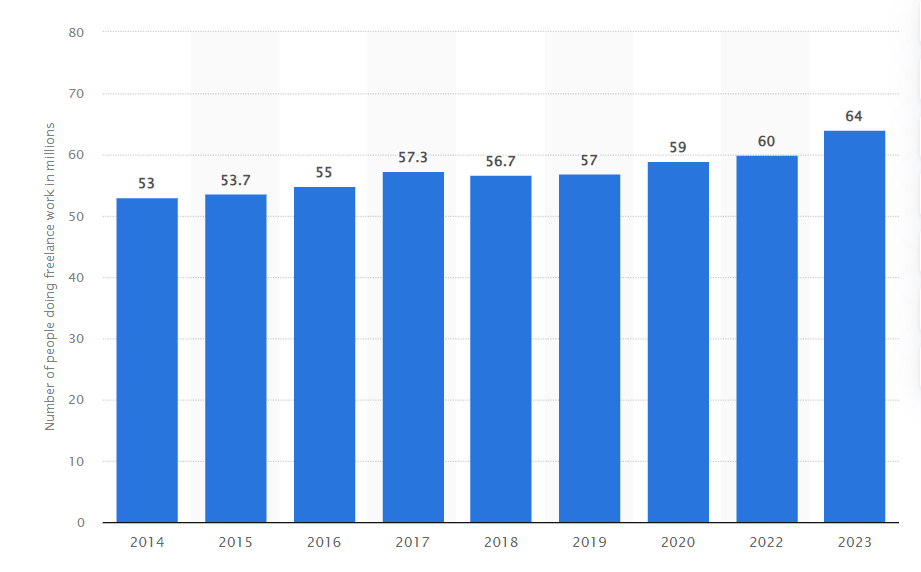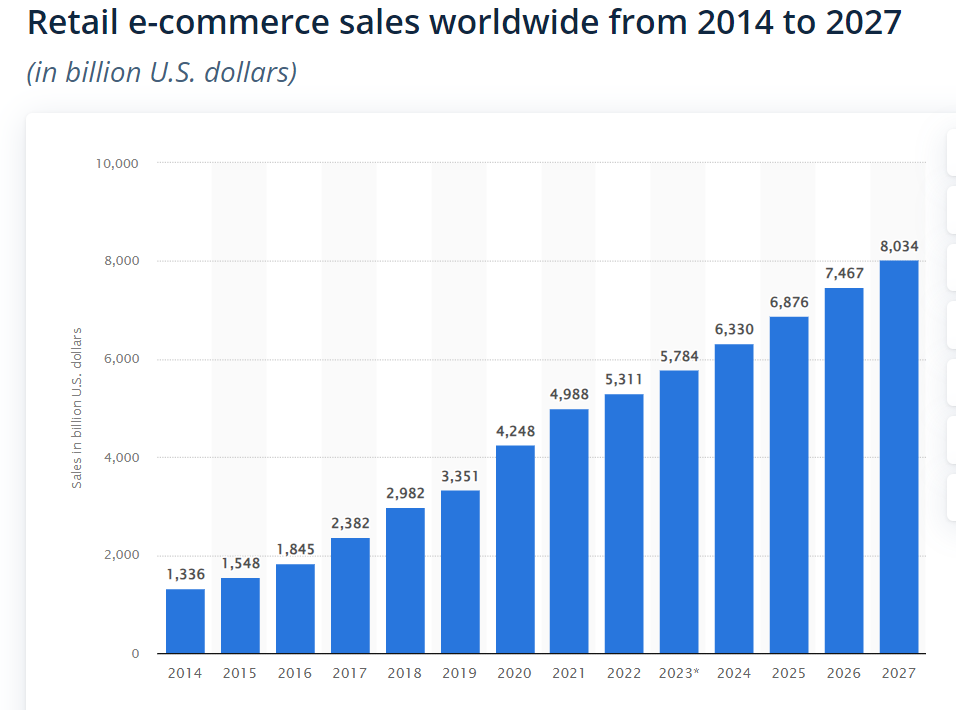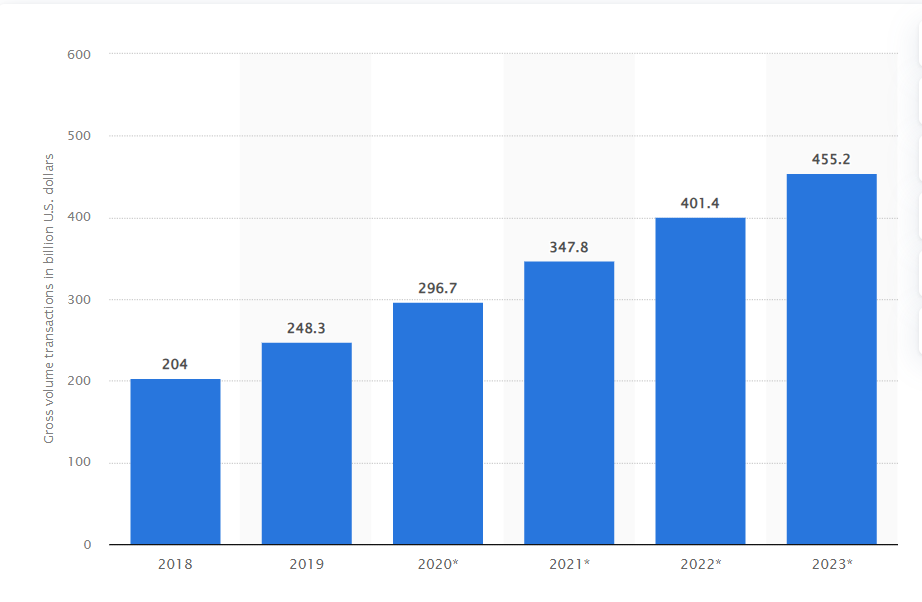Introduction
Table of Contents
The digital landscape is rapidly transforming, bringing with it a myriad of opportunities for generating income online. Over the past decade, we’ve seen an explosion of innovative ways to earn money, from freelancing and e-commerce to content creation and more. As technology continues to evolve, so do the prospects for online income. Understanding the future of online income is crucial for anyone looking to stay ahead in this dynamic field.
The gig economy is commonly defined as digital platforms that allow freelancers to connect with potential clients for short-term jobs, contracted work, or asset-sharing. Recent studies show that the global gig economy is expected to grow from $204 billion in 2018 to $455 billion by 2023, highlighting the significant potential for future online earnings. (Source – Statista). This surge is driven by advancements in technology, changing work preferences, and the growing demand for flexible work arrangements.
In this blog post, we’ll explore the current landscape, emerging technologies, and predictions for the future of online income, providing insights and opportunities for anyone looking to thrive in the digital economy.
Section 1: Current Landscape of Online Income
The current landscape of online income is diverse and rapidly expanding, offering a plethora of opportunities for individuals to earn money in innovative ways. Understanding this landscape is essential for anyone interested in the future of online income.
Popular Online Income Streams
Today, freelancing stands as one of the most popular online income streams. Platforms like Upwork and Fiverr have made it easier than ever for freelancers to connect with clients worldwide. In 2023, an estimated 64 million people were doing freelance work in the United States. This is an increase from 2014 when about 53 million people were freelancing. (Source – Statista)


E-commerce is another significant player in the online income arena. Global retail e-commerce revenues are projected to reach $5.8 trillion by 2023. This number is expected to increase by 39 percent over the next several years and reach eight trillion dollars by 2027. (Source – Statista).


Content creation has also surged in popularity, thanks to platforms like YouTube, TikTok, and Patreon. These platforms enable creators to monetize their content through ads, sponsorships, and direct support from their audience. In 2021, YouTube has a massive 2.49 billion people using it every month for marketing, highlighting the immense potential for content creators. (source – Vidico)
Trends in Online Income Growth
The growth of online income is driven by several key trends. Remote work has become more mainstream, accelerated by the COVID-19 pandemic. This shift has opened up new opportunities for online income, as more people seek flexible work arrangements.
Additionally, the rise of the gig economy has introduced micro-jobs and task-based work, allowing individuals to earn money on their own terms. Companies like TaskRabbit and Uber exemplify this trend, providing platforms for people to offer services ranging from handyman tasks to ride-sharing, shaping the future of online income.
Dominant Platforms and Players
Key platforms and players dominate the current online income landscape, shaping the future of online income. In freelancing, Upwork and Fiverr are leading the charge. In e-commerce, Amazon and Shopify set the standard. For content creation, YouTube and TikTok are unparalleled in their reach and monetization opportunities.
Understanding these platforms and the opportunities they offer is crucial for navigating the future of online income. As we move forward, staying informed about these trends and players will be essential for anyone looking to capitalize on the evolving digital economy.
Section 2: Emerging Technologies Shaping the Future
The rapid advancement of technology is continually reshaping how we earn money online. Understanding these emerging technologies is crucial for anticipating the future of online income.
Role of AI and Automation
Artificial intelligence (AI) and automation are at the forefront of technological innovation, creating new avenues for online income. AI-powered tools and platforms are revolutionizing industries by enhancing productivity and efficiency. For instance, AI-driven marketing tools can analyze vast amounts of data to optimize advertising strategies, enabling businesses to reach their target audience more effectively. As we look toward the future of online income, the impact of AI and automation will only continue to grow, offering even more opportunities for digital entrepreneurs.
Automation, through software like chatbots and robotic process automation (RPA), is streamlining repetitive tasks, allowing individuals and businesses to focus on higher-value activities. According to McKinsey, automation could raise productivity growth globally by 0.8 to 1.4 percent annually. (Source – McKinsey & Company)
Blockchain and Cryptocurrencies
Blockchain technology and cryptocurrencies are also significant contributors to the future of online income. Cryptocurrencies like Bitcoin and Ethereum have created new investment and earning opportunities. Decentralized finance (DeFi) platforms, which leverage blockchain technology, are enabling peer-to-peer financial transactions without traditional intermediaries.
In 2023, the global cryptocurrency market cap reached over $2 trillion, highlighting its growing influence. Additionally, non-fungible tokens (NFTs) are creating unique digital assets that can be bought and sold, opening up new income streams for artists and creators.
Impact of Virtual and Augmented Reality
Virtual reality (VR) and augmented reality (AR) are transforming the way we interact with digital environments, offering immersive experiences that extend beyond traditional online interactions. These technologies are finding applications in various sectors, including gaming, education, and real estate.
For example, VR platforms like Oculus allow users to experience virtual worlds, while AR apps like Pokémon Go blend digital elements with the physical world. Statista projects the AR & VR market is projected to generate revenue of US$40.4bn in 2024. As these technologies become more mainstream, they will provide novel ways to generate online income.
Understanding these emerging technologies and their potential applications is essential for anyone looking to navigate the future of online Income. By staying informed and adaptable, individuals and businesses can capitalize on these innovations and thrive in the evolving digital economy.
Section 3: Predictions for Future Online Income Streams
As technology continues to advance, predicting the future of online income involves identifying emerging trends and potential opportunities. Here are some key predictions for future online income streams.
Growth of the Gig Economy
Digital platforms that enable freelancers to engage with potential clients for contract work, short-term jobs, or asset-sharing are generally referred to as the gig economy. The gig economy is set to expand even further, offering flexible work arrangements and diverse income opportunities. According to Statista, from $204 billion in 2018 to $455 billion in 2023, the global gig economy is predicted to expand at a Compound Annual Growth Rate (CAGR) of 17.4%!


Furthermore, there will likely be 86.5 million freelance workers in the US by 2027, and will make up 50.9 percent of the total U.S. workforce. (Source – Statista)
Platforms like Upwork, Fiverr, and TaskRabbit will continue to dominate, but we’ll also see the rise of niche gig platforms catering to specific industries and skills.
Rise of Subscription-Based Services
Subscription-based services are becoming increasingly popular as consumers seek personalized and ongoing value. From streaming services like Netflix to subscription boxes like Birchbox, this model offers a steady income stream for businesses. In 2020, the global subscription e-commerce market was valued at $18.8 billion and is projected to reach $478.2 billion by 2025. (source – PR Newswire). Content creators, educators, and even traditional businesses are adopting subscription models to secure a reliable revenue stream.
Decentralized Finance (DeFi) and Blockchain
Decentralized finance (DeFi) is revolutionizing the financial industry by providing decentralized alternatives to traditional financial services. Utilizing blockchain technology, DeFi platforms offer lending, borrowing, and earning interest on cryptocurrency holdings without the need for intermediaries. Data from DefiLlama reveals that from October 1, 2023, to June 7, 2024, the 24-hour trade volumes on decentralized exchanges climbed from $1.7 billion to $5.1 billion. This shift is creating new income opportunities for tech-savvy individuals and investors.
Evolution of Remote Work
Remote work is here to stay, fundamentally changing how people earn a living. Companies are increasingly embracing remote work models, driven by advancements in communication and collaboration tools. A survey by Buffer in 2022 revealed that 97.6% of remote workers would like to work remotely, at least some of the time, for the rest of their careers. (source – Buffer). This trend is leading to the rise of remote job platforms and opportunities for professionals to work from anywhere.
Potential of Digital Real Estate
Digital real estate, including virtual properties and domains, is emerging as a lucrative income stream. The concept of owning and trading virtual land in platforms like Decentraland and Sandbox is gaining traction. In 2021, a virtual real estate plot sold for a record $2.4 million in Decentraland. (Source – Reuters). As more people and businesses explore virtual environments, the value and opportunities within digital real estate will continue to grow.
Understanding these predictions and staying adaptable will be crucial for anyone looking to thrive in the future of online income. By leveraging these emerging trends, individuals and businesses can position themselves for success in the evolving digital landscape.
Section 4: Opportunities in Niche Markets
As the digital landscape evolves, niche markets present unique and lucrative opportunities for generating online income. Understanding and tapping into these specialized areas is essential for anyone aiming to capitalize on the future of online income.
Exploring Untapped Niches
Niche markets are defined by their specialized focus, catering to specific interests and needs that are often overlooked by mainstream industries. Finding and pursuing these niches has a rewarding potential. For example, the pet care industry has seen a surge in niche products and services, such as personalized pet food subscriptions and luxury pet accessories. The global pet care market is expected to reach $358.62 billion by 2027. (Source – GlobeNewswire).
Importance of Personalization and Targeted Marketing
One of the key advantages of niche markets is the ability to provide highly personalized experiences. Consumers in niche markets often seek tailored solutions that address their unique preferences and pain points. By leveraging targeted marketing strategies, businesses can effectively reach and engage these specific audiences. Personalized email campaigns, social media advertising, and influencer partnerships are powerful tools for connecting with niche market consumers and will play a significant role in the future of online income.
Case Studies of Successful Niche Online Businesses
Several online businesses have successfully tapped into niche markets, setting examples for others to follow. For instance, The Sill, an online plant retailer, has capitalized on the growing trend of indoor gardening. By offering a curated selection of plants and personalized care advice, The Sill has built a loyal customer base and achieved significant growth. Such innovative approaches are indicative of the future of online income, where businesses can thrive by catering to specific interests and providing exceptional value.
Another example is MasterClass, a platform that provides online classes taught by renowned experts in various fields. By focusing on high-quality, niche content, MasterClass has attracted millions of subscribers and continues to expand its offerings. The platform’s unique approach to online education has set it apart from competitors and established it as a leader in the niche market of premium online learning, highlighting its role in the future of online income.
Section 5: Skills and Tools for Future Online Earners
To thrive in the future of online income, individuals must equip themselves with the right skills and tools. As the digital economy continues to evolve, these competencies will be crucial for maximizing earning potential.
Essential Skills for Future Online Earners
Digital Literacy: Digital literacy is fundamental for navigating the online income landscape. This includes proficiency in using digital tools, understanding online platforms, and staying updated with the latest technological trends. According to a study by the World Economic Forum, digital skills are among the top 10 skills needed for the future workforce. (Source – World Economic Forum)


Data Analysis: The ability to analyze data and derive actionable insights is increasingly important for the future of online income. Data analysis skills enable individuals to understand market trends, measure performance, and make informed decisions. Tools like Google Analytics and Tableau are essential for honing these skills and preparing for the evolving opportunities in the digital economy.
Cybersecurity Awareness: With the rise of online transactions and remote work, cybersecurity has become a critical skill. Understanding how to protect personal and business data from cyber threats is vital. According to Cybersecurity Ventures, cybercrime damages are predicted to cost the world $10.5 trillion annually by 2025. (Source – Cybersecurity Ventures Report on Cybercrime)
Content Creation and Marketing: Creating engaging content and effectively marketing it online is a valuable skill that will be crucial for the future of online income. This includes writing, video production, graphic design, and social media marketing. Platforms like Canva, Adobe Creative Suite, and Hootsuite are indispensable tools for content creators looking to excel in this evolving landscape.
Recommended Tools for Maximizing Online Earnings
Freelancing Platforms: Platforms like Upwork and Fiverr connect freelancers with clients, offering a wide range of job opportunities. These platforms provide a marketplace for skills ranging from writing and graphic design to programming and consulting.
E-commerce Platforms: Shopify and WooCommerce are popular tools for setting up and managing online stores. They offer user-friendly interfaces and a variety of features to help entrepreneurs sell products and services online.
Remote Work Tools: Tools like Slack, Zoom, and Asana facilitate communication and project management for remote teams. These tools are essential for maintaining productivity and collaboration in a remote work environment.
Financial Management Tools: Managing finances efficiently is crucial for online earners. Tools like QuickBooks and FreshBooks help track income and expenses, generate invoices, and manage taxes.
Importance of Continuous Learning and Adaptability
The digital economy is constantly evolving, making it essential to stay ahead by embracing continuous learning and adaptability. As we explore the future of online income, online courses, webinars, and industry conferences become invaluable resources for updating skills and knowledge. Platforms like Coursera, Udemy, and LinkedIn Learning offer a wide range of courses tailored to the needs of future online earners, helping them navigate and excel in the ever-changing landscape of online income opportunities.
By developing these essential skills and utilizing the right tools, individuals can position themselves for success in the future of online income. Staying informed and adaptable will be key to navigating the ever-changing digital landscape and maximizing earning potential.
Section 6: Challenges and Considerations
While the prospects for the future of online income are promising, there are significant challenges and considerations that individuals must navigate to succeed. Understanding these hurdles is essential for developing effective strategies and ensuring sustainable income streams.
Potential Risks and Challenges
Cybersecurity Threats: As online income opportunities grow, so do the risks associated with cybersecurity. Cyberattacks, data breaches, and identity theft are increasingly common. According to a report by Cybersecurity Ventures, cybercrime is expected to cost the world $10.5 trillion annually by 2025. Ensuring robust cybersecurity measures is critical to protecting sensitive information and maintaining trust with clients and customers.
Market Saturation: The popularity of online income streams has led to increased competition. As the future of online income evolves, e-commerce, freelancing, and content creation markets are becoming saturated, making it harder to stand out. To overcome this, individuals must differentiate themselves through unique value propositions and high-quality offerings.
Regulatory and Legal Considerations: Navigating the regulatory landscape can be complex, especially with the rise of new technologies like blockchain and DeFi. Compliance with local and international laws, including tax regulations and intellectual property rights, is crucial. Failure to adhere to these regulations can result in legal complications and financial penalties.
Legal and Ethical Considerations
Intellectual Property Rights: Protecting intellectual property (IP) is vital for online businesses and creators. This includes copyrights, trademarks, and patents. Understanding IP laws and taking necessary steps to protect original work can prevent unauthorized use and potential disputes.
Data Privacy: Ensuring data privacy and compliance with regulations like GDPR (General Data Protection Regulation) is essential. Collecting and handling user data responsibly helps build trust and avoid legal issues. A report by Deloitte highlighted that 73% of consumers are more concerned about their data privacy now than they were a few years ago.
Ethical Practices: Ethical considerations, such as transparency, honesty, and fair treatment of customers and employees, are crucial for long-term success in the future of online income. Businesses and individuals must adhere to ethical standards to maintain their reputation and customer loyalty.
Strategies for Overcoming Challenges
Investing in Security: Implementing advanced cybersecurity measures, such as encryption, two-factor authentication, and regular security audits, can mitigate risks. It’s also critical to keep up with the most recent security dangers and recommended measures.
Continuous Learning and Adaptation: The digital landscape is ever-changing, and understanding the future of online income is crucial. Staying updated with industry trends, new technologies, and regulatory changes is vital. Online courses, webinars, and industry conferences are excellent resources for continuous learning.
Building a Strong Brand: Differentiating oneself through a strong personal or business brand can help overcome market saturation. This involves creating a unique identity, providing exceptional value, and building a loyal customer base.
By understanding and addressing these challenges, individuals can better navigate the future of online income. With the right strategies and considerations in place, the opportunities for success in the digital economy are immense.
Conclusion
Navigating the future of online Income requires a keen understanding of emerging technologies, niche markets, essential skills, and potential challenges. As digital advancements continue to transform the economic landscape, the opportunities for generating income online are vast and varied.
From the rise of the gig economy and subscription-based services to the transformative power of AI, blockchain, and virtual reality, staying informed and adaptable is key to understanding the future of online income. Embracing continuous learning and leveraging the right tools will be crucial for success.
Despite the challenges, including cybersecurity threats and market saturation, the potential for online income remains strong. In the future of online income, individuals and businesses can thrive by building a strong brand, adhering to ethical practices, and staying ahead of industry trends.
As we look toward the future of online income, the possibilities are immense. By understanding these trends and preparing accordingly, you can seize the opportunities that lie ahead and achieve sustainable success in the digital economy.
Feel free to share your thoughts and predictions in the comments below and subscribe to our blog for more insights on the future of online income.


Thank you for your kind words! I’m glad you enjoyed the article. Your feedback inspires me to keep sharing valuable content.